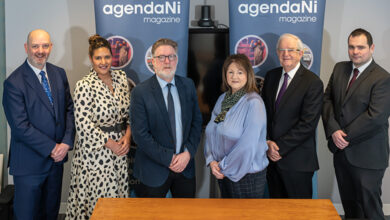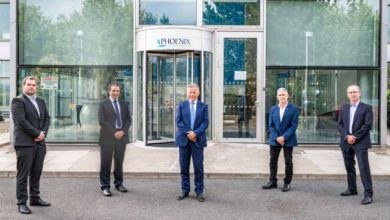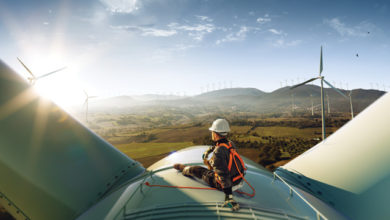Innovation and economic recovery

NIE Networks hosted a round table discussion with key stakeholders on the role of innovation as the key to economic recovery.
What are the key innovations necessary to rebuild the economy and the challenges in delivering these?
Adrian Doran
Every business has been forced to take stock of their operations in recent months and had to think about how they can adapt for change. We’ve seen innovative approaches to digital infrastructure, for example, facilitating remote working, however, there are also recognisable challenges in sectors such as hospitality and retail which are going to be economically impacted for some time. The opportunities and challenges facing our economy are multi-faceted, for instance skills and infrastructure, but they are also connected. They require collaboration. One of the advantages of Northern Ireland is our relatively small size, meaning that a joined-up approach to tackling challenges and capitalising on opportunities should be a real strength. We need to be more innovative in our approach to that.
Grainia Long
Integration is crucial. We can no longer afford to build infrastructure on a piece by piece basis and we should never have been allowed to afford it. The days of silos are over and what we need now is ‘multiple solvers’, levers that can be pulled to solve several problems at once, such as the electrification of transport. To do this we need to integrate systems in a way we never have before and we have scale on our side. A strong approach to integration should be our driver but I also think we need to level up the gap between Northern Ireland and the rest of the UK in relation to research and development funding. You can’t get innovation without investing in innovation.
Paul Stapleton
People are inclined to focus on technology when they think of innovation but I think there is a requirement for a much broader perspective incorporating innovation in governance, policy making, regulatory processes, business models, planning and financing arrangements. Innovation in these areas could be far more impactful than a focus on developing technology. The rest of the world will develop technologies that are fit for purpose here and what we need to focus on is creating the right environment to deploy and integrate those technologies. The public and the private sector demonstrated great agility throughout the pandemic and we should focus on instilling that as we go forward.
Richard Rodgers
The Department for the Economy (DfE) have published our medium-term economic recovery plan with clean energy at its centre. Northern Ireland did not benefit from fossil fuels and we’ve been at the mercy of price volatility of crude oil for decades. What is exciting is that we have emerged as a market leader in wind. NIE Networks and SONI have led the way on innovative engineering solutions to mean that we have the greatest penetration of renewables on an electricity system anywhere in the world. We need to continue to be innovative because while we are the market leader in wind, we’re also the market leader in curtailment. That’s a significant opportunity cost. Hydrogen presents great opportunities. Translink’s hydrogen pilot scheme is using electrolysis, powered by wind that would otherwise be curtailed to produce hydrogen and valuable oxygen. That’s innovation and an example of how we can get ahead.
Innovation is needed not only in the area of green hydrogen but also blue hydrogen and fundamentally too in relation to energy efficiency. It’s an exciting time because our population size means that we have an opportunity to test things quickly and move on. That requires collaboration between the public and private sectors. We ought to embrace innovation and perhaps not be so prudent all of the time.
We are a low productivity economy and the damage currently being done to sectors like hospitality and retail presents an opportunity to retrain and redeploy people.
— Adrian Doran, Chair, CBI NI
Ashleen Feeney
The pandemic has awakened people to the realities of climate change and what can happen when countries are not prepared for a major global event. Covid-19 has been a health and economic crisis but its impact will be small in comparison to that of climate change. It is a catalytic moment for Northern Ireland to catch-up and now accelerate towards a greener economy and the achievement of net zero.
The crisis has shown private sector and public sector collaboration, delivering what is needed at speed – this must become the new normal. Innovation across Northern Ireland’s current approach to the long-term planning of infrastructure investment, including the setting of a long-term vision covering not just the hard infrastructure that the Department for Infrastructure have responsibility for but also energy, digital and social infrastructure too. Furthermore, more innovative funding solutions will need to be embraced if infrastructure investment is to play a key role in the economic recovery and building a more inclusive and sustainable future.
Ian Campbell
The Covid crisis has forced us all to re-evaluate our society and its priorities and we’re pleased the Government are focusing the recovery of the economy on “building back better”. The focus needs to be on both improved connectivity and sustainable infrastructure. On connectivity, we recognise that consumer behaviours are changing and we are seeking to be agile in responding to changing demands. That means a new approach to transport, including active travel and network design, but also connectivity in relation to digital infrastructure and network communications.
On infrastructure, innovation needs to prioritise sustainable energy technologies and that’s where we’d like to see the focus in order to address climate change. We recognise that we can grow the market for hydrogen through the roll out of Fuel Cell powered public transport but to do that we need access to an available, low cost source of hydrogen which currently doesn’t exist in Northern Ireland. To accelerate the roll out of green, zero emission transport and the wider “green” economy, there needs to be further sustainable energy infrastructure that will produce more renewable electricity and also hydrogen because both are going to play a massive role in decarbonisation of transport and wider society.
Where should investment be prioritised to facilitate economic rebuilding and growth?
Adrian Doran
The Department for the Economy’s June report on rebuilding a stronger economy rightly outlined a desire to focus on those high-growth sectors such as health and life sciences, advanced manufacturing, clean energy and big data. I think a recognition is necessary that there is limited resources in the system and that we can’t boil the ocean. In the past we have perhaps tried to support every business and we should be focussing our energies on turbo-charging those high growth, high productivity sectors. We are a low productivity economy and the damage currently being done to sectors like hospitality and retail presents an opportunity to retrain and redeploy people.
Richard Rodgers
All of the sectors identified in the economic recovery report are interlinked. Clean energy needs those high growth sectors such as advanced manufacturing and digitalisation, high productivity sectors which represent a real opportunity to drive up the Gross Value Added in Northern Ireland. I think government needs to look at facilitating things differently. Taking the challenge to Invest NI as an example, they are working to look differently at how they support indigenous businesses to grow and take control of our supply chains utilising our indigenous resources and to export that IP in products and services.
The rest of the world will develop technologies that are fit for purpose here and what we need to focus on is creating the right environment to deploy and integrate those technologies.
— Paul Stapleton, Managing Director, NIE Networks
Paul Stapleton
What we need now is an urgency for action to find those projects and opportunities that align with our long-term ambitions, in the context of a very difficult economic setting. Undoubtedly, that will centre on zero carbon and we need to build on areas of strength in the energy sector. A lot more can be done in relation to our successes in wind but we also need to be investing and running trials in areas such as hydrogen, heat pump technology and innovations in transport. Some of this is ongoing on a small scale but there is a need to scale these pilots up so that they are developing supply chains and the skills that are needed in these sectors. Government won’t have enough money to do all of the innovation necessary and so it needs to set the right context for the unlocking of private capital.
Grainia Long
We’ve been doing quite a lot of work across the city in identifying the shovel ready projects that can offer immediate interventions. The last major recession was only a decade ago and so there’s an institutional memory of what worked and what didn’t. Three major challenges we’ve identified are Belfast’s aged housing stock, a traditional skills base in the city and high levels of fuel poverty. Investment in the retrofit of homes represents an opportunity for a low-carbon, jobs-led growth and will be a big feature of our soon to be published recovery plan. Additionally, the physical retrofit of homes offers the opportunity to roll out other infrastructure at scale such as smart meters, so we’re excited about the potential investment in these areas can have. Ten years ago we weren’t the strategic planning authority but we are now and we can’t ignore the fact that we have levers available to us. We’re looking at the assets we hold, the powers available to us and moving as quickly as possible to take action.
Ashleen Feeney
A retrofit programme offers a quick win. The Irish Government’s July Stimulus Plan announced funding of €100 million for an Energy Efficiency National Retrofit Programme, recognising the potential such an investment offers in terms of economic growth and the transition to a greener future. With more jobs becoming unsustainable as Covid-19 related Government financial supports to businesses are withdrawn and the full economic scars from the pandemic become clearer, there is an opportunity to quickly support people who want to stay in employment and re-skill them.
Looking to the medium and longer term, focus needs to shift to ‘shovel-worthy’ investments, that can shift the economic dial and deliver a permanent uplift in GVA. Identifying the optimal investment mix requires a more comprehensive programme approach and the use of next generation economic tools, some of which have been used to support prioritisation and practical decision-making across City Region and Growth Deals.
How important will delivering a sustainable pathway for transport be to underpinning long-term economic ambitions? What are the areas of greatest importance?
Ian Campbell
Any successful economy has a modern and efficient transport system. Recent investment in public transport, such as the Glider in Belfast and new trains, has brought about a recognisable modal shift from the car to public transport, which in turn promotes heath through active travel.
Transport uses one third of all energy in Northern Ireland and generates a quarter of greenhouse gases. Therefore, in tackling the climate emergency, transport is a key target area. In Translink we’ve identified quick but ambitious programmes to accelerate decarbonisation of transport and believe that with the right investment both Belfast and Derry’s bus networks could be zero emission by 2030. We’re discussing the significant acceleration of pilots around hydrogen and battery electric bus transport because if we’re serious about decarbonising the transport system we have to upscale renewable technologies in order to replace the energy for transport currently supplied by fossil fuels. This will require a significant increase in both renewable electricity and hydrogen supply.
Paul Stapleton
Transport is fundamental to a cohesive and well-balanced economy and a new model for transport is required to address climate action. Greater levels of electrification pose two challenges. Firstly, the electricity network needs to be able to cope with the demand. Whether wind is used to produce electricity for the network or for hydrogen, it needs a network to connect to and I think we need to be anticipating those network needs over the next decade and taking decisions in advance. Our current model is a reactive one and we need to reverse that. In terms of the private fleet, at a ground level, we need a much more extensive EV charging infrastructure. That ultimately shouldn’t be done by an electricity network operator like us but we have played a role in providing what exists currently and are prepared to play a role in extending that, pending the emergence of a commercial market.
The fact is that we haven’t got enough renewable energy to cover for the total removal of fossil fuels and that is why we need a lot of innovation to try and unlock green technologies.
— Richard Rodgers, Head of Energy, Department for the Economy
Richard Rodgers
Affordability is a recurring theme. Affordability in the household sector to tackle fuel poverty but also for business. We’ve experienced the pain of expensive electricity previously, a legacy from privatisation, and we must protect competitive electricity prices. That is why, in the Department, and as part of the energy strategy, we’re seeking the optimal pathway to decarbonisation. That means that some things might have to wait a few years as we seek to protect affordability. The fact is that we haven’t got enough renewable energy to cover for the total removal of fossil fuels and that is why we need a lot of innovation to try and unlock green technologies.
I used to be quite sceptical about the potential for blue hydrogen but I now recognise its potential as a transition fuel and a potential substitute fuel to decarbonise the transport pathway. Blue hydrogen offers a real value added economic opportunity for Northern Ireland over the next 10-20 years. Steam methane reforming is happening in other parts of the world but why can’t we use our advanced manufacturing capability, coupled with our wind penetration on the electricity side, to lead us more swiftly to zero carbon above any other modern economy?
We’re not going to be net zero carbon in less than a decade so what we must do is buy ourselves some time in these early years with national policy and bold statements.
— Grainia Long, Commissioner for Resilience, Belfast City Council
Grainia Long
I don’t think we shout loud enough about how ambitious we are and the speed at which we are moving in relation to transport. As a heavily car dependent city, Belfast and wider Northern Ireland is exposed to significant risks because of climate change and that’s impacting on our resilience. The economic impact of climate change is evident today. However, the last number of years have seen a shift in the levels of ambition and I pay tribute to Translink who have not only put 2030 targets in their sites but have a plan to follow through. It’s important that we shout about that and the public recognises the statement of intent because that drives behavioural change.
Outside of public transport, Belfast City Council are part of an Innovate UK-funded project around EV infrastructure. We need that to happen at scale but we also need to figure out the practicalities of delivering EV points. I don’t absolve our organisation and other large organisations from the need for progress on decarbonising freight vehicles and how we move waste around the city. We need to be much more proactive in planning for the decarbonised movement of people, goods and services and I don’t think we’re there yet.
Should the economic recovery be aided by a ‘green new deal’? And what would that look like?
Richard Rodgers
The phrase ‘green new deal’ has developed so many meanings recently but what it means to me is how you finance that transition to low-carbon and zero carbon energy. We have to wean people off fossil fuels and off grant culture. It’s about investing to save and government must find innovative ways to do that. Financial stimulus from a green new deal would have a multiplier effect on the economy. The recovery needs financed and it needs financed in a way that we don’t put all the costs into our infrastructure and makes us non-competitive.
Public sector and private sector collaboration is vital for an innovative recovery that is inclusive and sustainable.
— Ashleen Feeney, Markets Partner, KPMG
Ashleen Feeney
The green recovery is well documented and transition to net zero is imperative. However, funding, not financing, is a big challenge. There is a wall of capital out there seeking opportunities and we are at the start of a decade of low cost financing. However, a big debate is needed on infrastructure funding and who pays for the transition to a greener economy. A green new deal that stimulates the retrofit of housing stock in Northern Ireland would make a good start.
Adrian Doran
The wind energy sector has been a tremendous success story and a prime example of how very clever government policy in the form of renewables obligations certificates (ROCs) can facilitate lending to a sector and enable the mushrooming of that sector. It’s very unlikely that banks are going to finance risky new venture technology without some form of government support. A green new deal is about setting out a plan and being innovative in the business and funding models. If we’re nimble and agile enough to bring better collaboration between the private and public sectors, then we can do this.
Grainia Long
For me, it’s about how we restructure our economy and how we do that at pace. The University of Oxford recently published research by leading economists, who spoke to a wide range of stakeholders across the globe and identified five consistent policy items for fiscal stimulus including: clean physical infrastructure investment; building efficiency retrofits; investment in education and training to address immediate unemployment from Covid-19 and structural unemployment from decarbonisation; natural capital investment for ecosystem resilience and regeneration and; clean research and development investment. The point is that they’re not ground-breaking solutions, we know the pathways. We now need to link the governance, plans and strategies with the capital and investment. We recently undertook an economic analysis of decarbonisation for Belfast and it flagged up that we essentially have nine years of carbon left. We’re not going to be net zero carbon in less than a decade so what we must do is buy ourselves some time in these early years with national policy and bold statements. That for me is what a green new deal looks like.
Paul Stapleton
Financing is undoubtedly the biggest challenge we face and in the pending economic climate we need to find ways to unlock the private capital. Under our current model for electricity networks, we’re privately funded, we can go to capital markets, we can borrow money, but our investment plan is regulated. So, we’re investing in accordance to what the Utility Regulator determines is needed and is ultimately funded by electricity consumers. We see the electrification story as a real opportunity, because as consumers pay for clean energy and not traditional fossil fuels the increasing demand facilitates investment. Growth is the magic element here. If we can get growth and demand for clean energy, that will help to pay for the investment, which can be funded privately, off private balance sheets and regulated to ensure the investment is in line with public policy.
Ashleen Feeney
Investors are now banging the Environmental, Social and Governance (ESG) drum. If investee companies aren’t taking climate change seriously then investors will walk away, private capital is mobile. Sustainability matters are now front and centre of the CEO and boardroom agenda, which is a good thing.
What one area should policy makers and business leaders focus on for an innovative recovery?
Ashleen Feeney
The long-term approach to infrastructure planning, prioritisation and investment. Public sector and private sector collaboration is vital for an innovative recovery that is inclusive and sustainable.Adrian Doran
I think skills in terms of how we educate our young people and how we retrain and redeploy those traditional workers. It’s critical to get innovation in the new economy.
If we’re serious about decarbonising the transport system we have to upscale renewable technologies in order to replace the energy for transport currently supplied by fossil fuels.
— Ian Campbell, Director of Service Operations, Translink
Ian Campbell
I agree it is skills and would ask for a renewed emphasis on apprenticeships. If we are going to meet the ambitions of innovation then we are going to need the people to deliver that. We need to support and incentivise organisations to focus on apprenticeships which will help the next generation of school leavers find employment in the growth sectors of sustainable and digital technologies. Northern Ireland has the opportunity to be a world leader in sustainable technologies such as the Hydrogen sector. To realise this opportunity we need to focus on creating high tech apprenticeships that in turn will drive growth of the sustainable economy and create employment.
Paul Stapleton
I believe the biggest difference would be made by the Northern Ireland Executive adopting an ambitious climate change target and enshrining that in legislation. The setting of direction would be a huge impetus for enabling investment and activity right across the economy and across all sectors.
Richard Rodgers
We are a windy region. We have 48 per cent of our electricity generated today from renewable sources. The focus of our innovative efforts should be on creating sustainable employment, skills development and investment in low and zero carbon solutions. If ever there was an area ripe for public/private collaboration, this is it.
Grainia Long
As well as decarbonising our transport system, imagine if we took a similar target to ensure energy efficient buildings across Northern Ireland for 2030. That would guarantee jobs, supply chains and skill up a new generation in building technologies. It’s a practical programme that the public would understand. Crucial to policy success is ensuring that the public are on board because it’s about changing behaviours.
Round table participants
Ian Campbell
Ian Campbell is the Director of Service Operations for Translink. He is responsible for the delivery of Translink’s bus and rail services in Northern Ireland. He has undertaken a number of senior roles within Translink having previously worked in the Railway Industry in Great Britain. He is a Chartered Engineer, Fellow of the Institution of Mechanical Engineers and Fellow of the Institution of Railway Operators.
Adrian Doran
Adrian is Head of Corporate Banking for Barclays in Northern Ireland and is the current Chair of the CBI. Adrian is a qualified Chartered Accountant and is also a member of the Senate of Queen’s University Belfast and a member of HM Treasury’s Infrastructure Review Panel.
Ashleen Feeney
Ashleen is a Markets Partner at KPMG and responsible for pursuing new growth opportunities in Northern Ireland across Corporates, Government and Family Businesses. She has a background in infrastructure advisory. Ashleen is a Fellow of Chartered Accountants Ireland, Member of CBI (NI) Regional Council, Chair of CBI (NI) Infrastructure Working Group and a Member of the Institute of Directors. Ashleen was recently appointed to the Ministerial Advisory Panel on Infrastructure.
Grainia Long
Grainia is Commissioner for Resilience for the city of Belfast, based in Belfast City Council. Previous to this, she was Chief Executive of ISPCC Childline. This position followed several years working in housing, including as Chief Executive of the Chartered Institute of Housing (CIH), and National Director of the CIH in Northern Ireland. She is currently Chair of Metropolitan Thames Valley Housing Trust, a social housing provider in England, and Senior Independent Director on MTVH Group Board.
Richard Rodgers
Richard is Head of Energy at the Department for the Economy and has over 30 years’ experience in the energy industry, including at British Gas, Phoenix Natural Gas and as Managing Director (International) at Eaga. He is currently a Strategic Advisor (Energy) at the Strategic Investment Board (seconded into DfE). Richard was a non-executive director on the Board of the Utility Regulator for eight years (ending in March 2019).
Paul Stapleton
Paul is Managing Director of NIE Networks and joined the company in 2018. Prior to becoming Managing Director, Paul worked for ESB for over 25 years, where he held a number of senior management positions including General Manager of Electric Ireland, ESB Group Treasurer and Financial Controller of ESB Networks Limited. Paul is also a director of Energy Networks Association Ltd and a committee member of the Institute of Directors in Northern Ireland.





